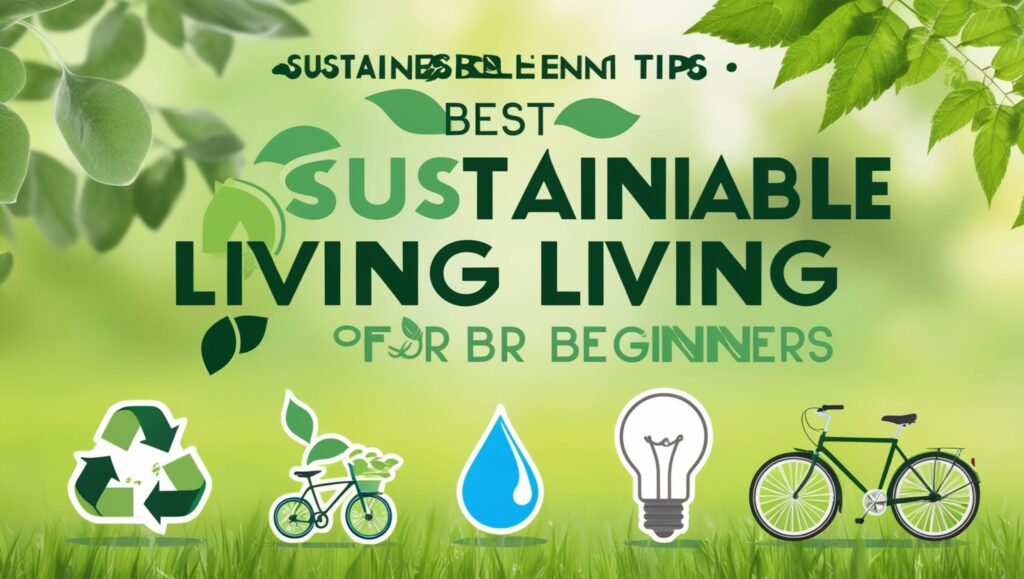Best Sustainable Living Tips for Beginners
Living sustainably means making choices that help protect the environment, support communities, and save natural resources for future generations. If you’re new to sustainable living, it may seem overwhelming, but small, practical steps can make a big difference. Here are some beginner-friendly tips to help you start your journey towards a more sustainable lifestyle.
1. Reduce, Reuse, Recycle
The first step towards sustainability is adopting the “3 Rs” approach: reduce, reuse, and recycle.
- Reduce: Minimize your consumption by avoiding unnecessary purchases. Ask yourself if you really need something before buying it.
- Reuse: Choose reusable products over single-use items. For example, use cloth bags instead of plastic ones, or buy a refillable water bottle.
- Recycle: Properly separate your waste for recycling. Check local guidelines to ensure you’re recycling items correctly.
2. Minimize Energy Use
Reducing your energy consumption is a simple yet effective way to live sustainably.
- Switch to LED bulbs: LED bulbs use less energy and last longer than traditional light bulbs.
- Unplug unused electronics: Devices left plugged in continue to draw energy even when turned off. Unplug them to reduce “phantom” energy consumption.
- Use natural light: During the day, open your blinds or curtains to take advantage of natural sunlight instead of turning on lights.
3. Adopt a Plant-Based Diet
You don’t have to give up meat completely, but incorporating more plant-based foods in your diet can greatly reduce your carbon footprint.
- Meatless Mondays: Start by having at least one day a week where you eat no meat.
- Buy local and organic: Choosing locally grown and organic foods reduces transportation emissions and avoids harmful pesticides.
4. Conserve Water
Water is a precious resource, and conserving it is an important part of sustainable living.
- Fix leaks: Leaky faucets and pipes waste a lot of water. Fix them as soon as you notice a problem.
- Take shorter showers: Cutting your shower time by just a few minutes can save gallons of water.
- Use a water-efficient showerhead: This can help you save water without compromising on water pressure.
5. Choose Sustainable Transportation
The way you travel has a big impact on the environment. Making more eco-friendly transportation choices can help reduce your carbon footprint.
- Walk or cycle: For short distances, choose to walk or ride a bicycle instead of driving.
- Use public transport: Buses, trains, and trams are more eco-friendly than individual car rides.
- Carpool: Share a ride with friends or colleagues to reduce the number of vehicles on the road.
6. Support Ethical Brands
The brands you buy from matter. Support companies that prioritize sustainability and ethical practices.
- Look for certifications: Check for labels such as Fair Trade, Rainforest Alliance, or B Corporation, which indicate ethical practices.
- Buy second-hand: Purchasing second-hand items not only saves money but also reduces waste.
- Avoid fast fashion: Instead of buying cheap, trendy clothes that won’t last, invest in quality pieces that are made to last.
7. Grow Your Own Food
Starting a small garden is a great way to embrace sustainability.
- Start with herbs: Herbs are easy to grow and can be kept in small pots, making them ideal for beginners.
- Use compost: Create a compost bin with kitchen scraps to make nutrient-rich soil for your garden.
- Support local biodiversity: Plant native species that attract bees and other pollinators.
8. Switch to Eco-Friendly Products
Many everyday products have sustainable alternatives that are better for the environment.
- Natural cleaning products: Use eco-friendly cleaning products or make your own using vinegar, baking soda, and lemon.
- Biodegradable soaps and shampoos: These products break down more easily in the environment, reducing pollution.
- Reusable household items: Swap disposable items like paper towels with washable cloths or sponges.
9. Educate Yourself and Others
Learning more about sustainability will help you make better choices and inspire others to do the same.
- Read books and articles: Stay informed about the latest environmental issues and sustainable practices.
- Join a community: Participate in local sustainability groups to learn more and share ideas.
- Advocate for change: Encourage others to adopt sustainable habits by sharing your journey on social media or speaking at community events.
10. Start Small, But Stay Consistent
It’s easy to get overwhelmed, so start with small changes that you can stick to.
- Set achievable goals: Focus on one or two areas at a time, like reducing plastic use or conserving energy.
- Track your progress: Keeping a record of your sustainable actions can help you stay motivated.
Conclusion
Sustainable living doesn’t require a complete lifestyle overhaul. By making small, mindful changes, you can gradually build habits that contribute to a healthier planet. Remember, every small action counts and can lead to a significant positive impact over time.


